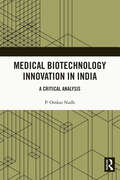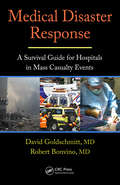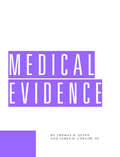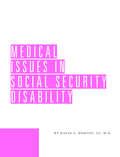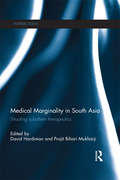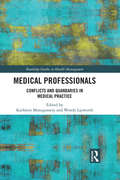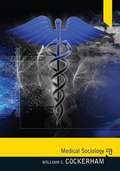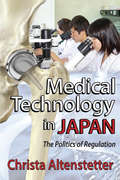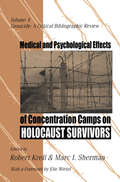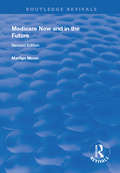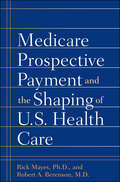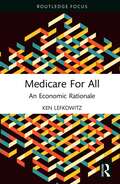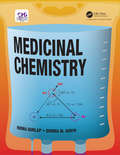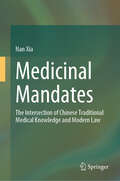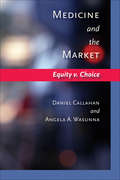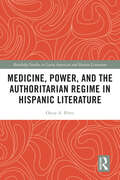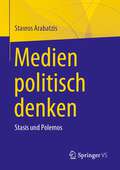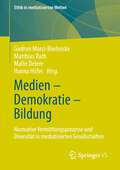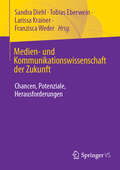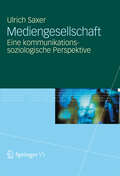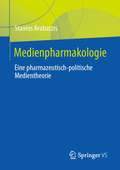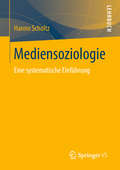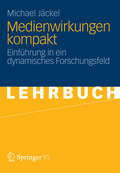- Table View
- List View
Medical Biotechnology Innovation in India: A Critical Analysis
by P Omkar NadhThis book examines the medical biotechnology industry in India through the lens of critical political economy. It discusses the sharp trajectory of growth in the biotechnology business and the state of investments, subsidies and patents which propelled the rise of the industry in India. The book uses in-depth interviews and case studies to analyse the roles of various financial actors, state institutions, and academia in the medical biotechnology ecosystem. Focusing on the relationship between India’s neo-liberal policies and the swift growth of the industry, the author examines the merits and demerits of the current market-driven biomedical ecosystem exploring the trends in the industry, bio-medical start-ups, the use of human resource and capital accumulation process. The book reiterates and emphasizes the need for the democratization of scientific and medical work and for striking a balance between economic gains and public health priorities. Comprehensive and insightful, this book will be of interest to scholars and researchers of science technology society studies, public health, economics, business studies, medical sociology, public policy, and political science.
Medical Disaster Response: A Survival Guide for Hospitals in Mass Casualty Events
by David Goldschmitt Robert BonvinoWhile the job of a clinician in a disaster scenario is to save lives without regard for the cause or rationale for the injury, medical and emergency professionals who understand the diverse aspects of a disaster are better equipped to respond effectively. Giving emergency personnel the tools they need to perform in catastrophic situations, Medical
Medical Evidence
by Thomas Quinn James LawlorMedical Evidence When litigating difficult-to explain medical issues, pictures are worth a lot more than a thousand words. Unfortunately, medically-accurate illustrations can cost hundreds of dollars each. Here is affordable help. Thomas Quinn and James Lawlor's Medical Evidence will equip you to handle medical topics with confidence and authority, providing: * Over 400 detailed medical illustrations * Anatomy in plain English * Case studies of common injuries * Questions and answers for experts * Sources of additional information These are not simple line drawings you usually find in law books. Medical Evidence contains professional-quality illustrations and photographs of extraordinary detail. All are labeled and supported by textual discussions.
Medical Issues in Social Security Disability
by David MortonAuthor Dr. David Morton has personally made more than 50,000 disability determinations for the Social Security Administration. As a Chief Medical Consultant, he hired, trained, supervised, and evaluated the work of both medical doctors and clinical psychologists. Now, Dr. Morton has made his expertise available to claimants' representatives with Medical Issues in Social Security Disability, a revealing and practical look inside the SSA's medical evaluation system. This comprehensive book explains how the SSA interprets key Listings: * What symptoms, physical signs, laboratory test abnormalities, and regimen response are needed to qualify, * The medical data which should be included in the claimant's file to obtain a favorable decision, and * Common issues faced by the claimant or the SSA, with a heavy focus on residual functional capacity. The book is filled with nuggets about shortcomings in submitted medical records, the types of mistakes adjudicators are most likely to make, where generous allowances are provided claimants, ailments and tests frequently overlooked by treating doctors, and much more.
Medical Marginality in South Asia: Situating Subaltern Therapeutics (Intersections: Colonial and Postcolonial Histories)
by Projit Bihari Mukharji David HardimanExamining the world of popular healing in South Asia, this book looks at the way that it is marginalised by the state and medical establishment while at the same time being very important in the everyday lives of the poor. It describes and analyses a world of ‘subaltern therapeutics’ that both interacts with and resists state-sanctioned and elite forms of medical practice. The relationship is seen as both a historical as well as ongoing one. Focusing on those who exist and practice in the shadow of statist medicine, the book discusses the many ways in which they try to heal a range of maladies, and how they experience their marginality. The contributors also provide a history of such therapeutics, in the process challenging the widespread belief that such ‘traditional’ therapeutics are relatively static and unchanging. In focusing on these problems of transition, they open up one of the central concerns of subaltern historiography. This is an important contribution to the history of medicine and society, and subaltern and South Asian studies.
Medical Professionals: Conflicts and Quandaries in Medical Practice (Routledge Studies in Health Management)
by Kathleen Montgomery Wendy LipworthMedical Professionals: Conflicts and Quandaries in Medical Practice offers a fresh approach to understanding the role-related conflicts and quandaries that pervade contemporary medical practice. While a focus on professional conflicts is not new in the literature, what is missing is a volume that delves into medical professionals’ own experience of the conflicts and quandaries they face, often as a result of inhabiting multiple roles. The volume explores the ways in which these conflicts and quandaries are exacerbated by broader societal forces, including changing scientific and technological paradigms, commercialization, and strengthened consumer movements, which simultaneously expand the scope of roles and responsibilities that medical professionals are expected to fulfill, and make it more difficult to do so. Several empirical chapters analyze data from qualitative interview studies with clinicians and other stakeholders. The studies highlight the burdens on clinicians who are expected to make informed and justified judgments and decisions in the midst of competing pressures; authors describe the methods that clinicians use to address the associated tensions within specific contexts. Two conceptual chapters follow and offer some innovative ways to think about the challenges facing medical professionals as they strive to make sense of the changing landscape within healthcare. The first reflects on the challenges to clinical practice in the midst of shifting and often competing definitions of disease and associated ideologies of care. The second reflects more broadly on the utility of value pluralism as a framework for conceptualizing and working through moral and professional quandaries. The book concludes with a chapter containing suggestions for how members of the medical profession might reframe their thinking about their roles, responsibilities, and decision-making in the midst of inevitable quandaries such as those presented here. This book will be of vital reading for academics, researchers, educators, postgraduate students, and interested health care practitioners and administrators.
Medical Sociology (12th edition)
by William C. CockerhamFor upper-division undergraduate/beginning graduate-level courses in Medical Sociology, and for Behavioral Science courses in schools of Public Health, Medicine, Pharmacy, and Nursing. Offers a comprehensive overview of the most current issues in medical sociology. The standard text in the field, this best-selling introduction to medical sociology presents the most recent and relevant ideas, concepts, themes, issues, debates, and research findings. It contains first-person accounts from patients, physicians, and other health care providers. It is based on a worldwide review of the literature and provides the most recent health statistics, data, and studies available while identifying the most important trends and issues.
Medical Technology in Japan: The Politics of Regulation
by Christa AltenstetterJapan is suffering from a "device gap." Compared to its American and European counterparts, Japan lags in adopting innovative medical devices and making new treatments and procedures available to its patients. Many blame its government and bureaucracy for Japan's delayed access to modern medicine and new medical devices. Christa Altenstetter examines the contextual social, historical, and political conditions of Japan's medical field to make sense of the state of the country's medical profession and its regulatory framework. She explores the development of regulatory frameworks and considers possibilities for eventual reform and modernization. More specifically, Altenstetter looks into how physicians and device companies connect to the government and bureaucracy, the relationships connecting Japanese patients to their medical system and governmental bureaucracy, and how the relationships between policymakers and the medical profession are changing. The issues addressed here are becoming increasingly relevant as numerous countries in Asia, Latin America, and Central and Eastern Europe are only now beginning to regulate medical technology, following the lead of the US and the European Union. Those interested in global medicine and Asian studies will find this book both informative and compelling.
Medical and Psychological Effects of Concentration Camps on Holocaust Survivors: A Research Bibliography (Genocide Ser. #Vol. 4)
by Robert Krell & Marc I. ShermanThis unique research bibliography is offered in honor of Leo Eitinger of Oslo, Norway. Dr. Eitinger fled to Norway in 1939, at the start of the World War II. He was caught and deported to Auschwitz, where, among others, he operated on Elie Wiesel who has written the foreword to this volume. After the war, Eitinger became a pioneering researcher on a subject from which many shied away. His contributions to understanding of the experience of massive psychological trauma have inspired others to do similar work. His many books and papers are listed in this special volume of the acclaimed bibliographic series edited by Israel W. Charny of The Institute on the Holocaust and Genocide in Jerusalem.In order to acquaint users of this bibliography with the topic, two introductory articles are offered. The first is titled "Survivors and Their Families" and deals with the impact of the Holocaust on individuals. The second, "Psychiatry and the Holocaust," examines the general impact of the Holocaust on the field of psychiatry. Robert Krell writes that in general the psychiatric literature has reflected critically on the survivor due to preconceived notions held by many mental health professionals. For many years, the exploration of victims' psychopathology obscured the remarkable adaptation made by some survivors. The problems experienced by survivors and possible approaches to treatment were entirely absent from mainstream psychiatric textbooks such as the Comprehensive Textbook of Psychiatry throughout the 1960s and 1970s.Fifty years of observations about survivors of the concentration camps and other survivors of the Holocaust (in hiding, as partisans, in slave labor camps) has provided a new body of medical and psychiatric literature. This comprehensive bibliography contains a plethora of references to significant pieces of literature regarding the Holocaust and its effects on survivors. It will be of inestimable value to physicians, psychiatrists, psychologists, and social workers, along with historians, sociologists, and Holocaust studies specialists.
Medicare Now and in the Future (Routledge Revivals)
by Marilyn MoonFirst published in 1997, this volume approaches the controversial issue of Medicare and its future. First passed in 1965 to aid payments for elderly and disabled medical care, the costs had ballooned in the 1990s, asking questions about how to improve its efficiency. An original goal of this book was to contextualise Medicare within the anticipated comprehensive restructuring of American healthcare. With Medicare 10% of the federal budget at the original time of publication, Marilyn Moon now takes another look at Medicare and discusses how the budget could be tightened without threatening the function of Medicare, with an emphasis on better targeting. In particular, the novel issue of means testing is explored. Having researched Medicare since 1981, Moon recasts her book by discussing issues including Medicare’s context, ensuring access, containing costs, the Medicare Catastrophic Coverage Act, the potential for marginal changes, reducing costs, expanding Medicare and ultimately how Medicare should look to change.
Medicare Prospective Payment and the Shaping of U.S. Health Care
by Rick Mayes Robert A. BerensonThis is the definitive work on Medicare’s prospective payment system (PPS), which had its origins in the 1972 Social Security Amendments, was first applied to hospitals in 1983, and came to fruition with the Balanced Budget Act of 1997. Here, Rick Mayes and Robert A. Berenson, M.D., explain how Medicare’s innovative payment system triggered shifts in power away from the providers (hospitals and doctors) to the payers (government insurers and employers) and how providers have responded to encroachments on their professional and financial autonomy. They conclude with a discussion of the problems with the Medicare Modernization Act of 2003 and offer prescriptions for how policy makers can use Medicare payment policy to drive improvements in the U.S. health care system.Mayes and Berenson draw from interviews with more than sixty-five major policy makers—including former Treasury secretary Robert Rubin, U.S. Representatives Pete Stark and Henry Waxman, former White House chief of staff Leon Panetta, and former administrators of the Health Care Financing Administration Gail Wilensky, Bruce Vladeck, Nancy-Ann DeParle, and Tom Scully—to explore how this payment system worked and its significant effects on the U.S. medical landscape in the past twenty years. They argue that, although managed care was an important agent of change in the 1990s, the private sector has not been the major health care innovator in the United States; rather, Medicare’s transition to PPS both initiated and repeatedly intensified the economic restructuring of the U.S. health care system.
Medicare for All: An Economic Rationale
by Ken LefkowitzHealthcare continues to be one of the defining political issues in the US. Though many progressives argue for an overhaul of the current system based on ethical or humanitarian principles, this important book offers an economic rationale for providing healthcare for all. The purpose of Medicare For All: An Economic Rationale is to demonstrate how current runaway healthcare prices can be addressed by implementing the cost-effectiveness of Medicare for All. Written by a former Corporate Director and healthcare consultant, this book illustrates why the current free market model for healthcare is ultimately failing the country by not containing rising healthcare costs, which has a severe economic impact on all Americans, including those covered by employer medical plans. Major factors in that failure; the lack of transparency, human decision factors, and high administrative costs in the current system are explored. The book demonstrates that implementing Medicare For All, providing comprehensive benefits with no copays, private insurance premiums, deductibles, or other cost-sharing, will not only improve the lives of most Americans, but will be far more cost-effective than the present system. This is an incisive, important contribution to a topic that continues to shape American political discourse and will be of interest to scholars and professionals engaged in this area as well as politicians and the public in general.
Medicinal Chemistry
by Norma K Dunlap Donna M Huryn<p>Medicinal Chemistry begins with the history of the field, starting from the serendipitous use of plant preparations to current practice of design- and target-based screening methods. Written from the perspective of practicing medicinal chemists, the text covers key drug discovery activities such as pharmacokinetics and patenting, as well as the classes and structures of drug targets (receptors, enzymes, nucleic acids, and protein-protein and lipid interactions) with numerous examples of drugs acting at each type. <p>Selected therapeutic areas include drugs to treat cancer, infectious diseases, and central nervous system disorders. Throughout the book, historical and current examples illustrate the progress to market and case studies explore the applications of concepts discussed in the text. Each chapter features a Journal Club, as well as review and application questions to enhance and test comprehension. This textbook is ideal for upper-level undergraduates and graduate students taking a one-semester survey course on medicinal chemistry and/or drug discovery, as well as scientists entering the pharmaceutical industry.</p>
Medicinal Mandates: The Intersection of Chinese Traditional Medical Knowledge and Modern Law
by Nan XiaThis book provides an in-depth analysis of Traditional Medical Knowledge (TMK) in China, focusing on its preservation, responsible use, and integration into modern intellectual property (IP) frameworks. It explores the unique challenges of protecting TMK within China&’s historical, cultural, and societal contexts, while also considering alternative regulatory mechanisms like Access and Benefit-Sharing (ABS) regimes and TMK databases. Through case studies such as the commercialization of Qinghao, the book examines the role of TMK in pharmaceutical innovation and critiques the applicability of Western IP systems to Chinese TMK. It also discusses the need for culturally sensitive legal reforms, offering practical insights for scholars, policymakers, and practitioners interested in IP law, traditional medicine, and cultural preservation. This work is enriched with comparative legal analyses and detailed examples, providing a clear understanding of the complexities surrounding TMK in China and its impact on both cultural heritage and innovation.
Medicine and Public Health in Latin America
by Steven Palmer Marcos CuetoDespite several studies on the social, cultural, and political histories of medicine and of public health in different parts of Latin America and the Caribbean, local and national focuses still predominate, and there are few panoramic studies that analyze the overarching tendencies in the development of health in the region. This comprehensive book summarizes the social history of medicine, medical education, and public health in Latin America and places it in dialogue with the international historiographical currents in medicine and health. Ultimately, this text provides a clear, broad, and provocative synthesis of the history of Latin American medical developments while illuminating the recent challenges of global health in the region and other developing countries.
Medicine and the Market: Equity v. Choice (Bioethics)
by Daniel Callahan Angela A. WasunnaOutstanding Academic Title for 2007, Choice MagazineMuch has been written about medicine and the market in recent years. This book is the first to include an assessment of market influence in both developed and developing countries, and among the very few that have tried to evaluate the actual health and economic impact of market theory and practices in a wide range of national settings.Tracing the path that market practices have taken from Adam Smith in the eighteenth century into twenty-first-century health care, Daniel Callahan and Angela A. Wasunna add a fresh dimension: they compare the different approaches taken in the market debate by health care economists, conservative market advocates, and liberal supporters of single-payer or government-regulated systems. In addition to laying out the market-versus-government struggle around the world—from Canada and the United States to Western Europe, Latin America, and many African and Asian countries—they assess the leading market practices, such as competition, physician incentives, and co-payments, for their economic and health efficacy to determine whether they work as advertised. This timely and necessary book engages new dimensions of a development that has urgent consequences for the delivery of health care worldwide.
Medicine, Power, and the Authoritarian Regime in Hispanic Literature (Routledge Studies in Latin American and Iberian Literature)
by Oscar A. PérezThis book offers a substantial examination of how contemporary authors deal with the complex legacies of authoritarian regimes in various Spanish-speaking countries. It does so by focusing on works that explore an under-studied aspect: the reliance of authoritarian power on medical notions for political purposes. From the Porfirian regime in Mexico to Castro’s Cuba, this book describes how such regimes have sought to seize medical knowledge to support propagandistic ideas and marginalize their opponents in ways that transcend specific pathologies, political ideologies, and geographical and temporal boundaries. Medicine, Power, and the Authoritarian Regime in Hispanic Literature brings together the work of literary scholars, cultural critics, and historians of medicine, arguing that contemporary authors have actively challenged authoritarian narratives of medicine and disease. In doing so, they continue to re-examine the place of these regimes in the collective memory of Latin America and Spain.
Medien politisch denken: Stasis und Polemos
by Stavros ArabatzisDer hier vorgelegte Band möchte ‚Medien‛ von ihrem traditionellen Ort auf das politische Feld hin verlagern. Medien sind nämlich nicht nur als intellektuelles oder ästhetisches Spiel (kommunikatives, sprachliches, schriftliches, technisches, profitrationales, instrumentelles, hermeneutisches oder mathematisch-informatisches), vielmehr auch als politischer Ernstfall zu begreifen. Daher geht diese „Medientheorie‟ der Frage nach, „warum die Menschheit anstatt in einen wahrhaft menschlichen Zustand einzutreten, in eine neue Art von Barbarei versinkt‟ (Adorno/Horkheimer). Diese Frage, so unsere These, ist eine mediale, die aus der anfänglich ‚verkehrten Setzung‛ (kata-strophen) der Medien resultiert und dann ihren historisch-gesellschaftlichen, sozialen und politischen Fortschritt bestimmt. Die Hauptthese dieses Buches lautet, dass wir es in den ‚Medien‛ nicht mehr mit einem theoretischen, technisch-ästhetischen oder informatischen Spiel zu tun haben. Vielmehr mit dem politischen Ernstfall, wo es nämlich um Wahrheit oder Falschheit innerhalb der Polis und ihren jeweils geltenden Gesetzen geht. Es sind die zwei unterschiedlichen Bereiche (intellektuelles und ästhetisches Spiel hier und politischer Ernstfall dort), die nicht miteinander verwechselt werden dürfen, weil letzterer existenziell ist und darin um Leben oder Tod geht.Medien heute sind selbst zu den kulturellen, technischen, ökonomischen und politischen ‚Waffen‛ geworden, um darin ihr ‚Wesen‛ und ‚Unwesen‛ zu verbergen. Damit hat auch jene ‚technizistische Medientheorie‛ ihren metaphorischen Charakter verloren – der „Krieg als das Eigentliche der Medien‟ (Kittler) – und ist in den politischen, geopolitischen, finanz- und informationsökonomischen Raum überführt worden. Die medientheoretische These Kittlers (Medien als „Heeresgerät‟: Medien als ein zweckentfremdetes Kriegsgerät stellen eine Art Abfallprodukt dar, das solange in seiner Funktion verkannt wird, solange die primäre militärische Funktion ignoriert bleibt), ist somit, so unsere These in diesem Buch, nicht „technisch‟, sondern politisch (staatlich) und ökonomisch-gesellschaftlich-sozial (vorstaatlich) zu verstehen: Medientheorie als „Stasiologie‟ (Theorie des Bürgerkriegs) und „Polemologie‟ (Theorie des Kriegs). Ein antagonistisch-polemisches Prinzip, das alle Medien im öffentlichen Raum scharf stellt, so dass jenes „agonische‟ Kampfprinzip (C. Mouffe) nur eine Vorstufe dazu bildet und daher noch im Raum des Spiels verbleibt. Wir brauchen daher, so unsere abschließende These, kein technisches, hermeneutisches, ästhetisches, phänomenologisches, anthropologisches oder ontologisches Apriori, das Medien in ihrem Wesen oder Unwesen erklärt, sondern eine Stasiologie und eine polemologie, die das ganze antagonistisch-polemische Feld der Medien im öffentlichen Raum zu erschließen vermögen. Erst dieses Scharfstellen der Medien im öffentlichen Raum erlaubt es nämlich auch über dieses antagonistisch-polemische Prinzip hinauszugelangen.
Medien – Demokratie – Bildung: Normative Vermittlungsprozesse und Diversität in mediatisierten Gesellschaften (Ethik in mediatisierten Welten)
by Matthias Rath Gudrun Marci-Boehncke Malte Delere Hanna HöferDie Beiträge des Bandes thematisieren den Zusammenhang von Medien, Demokratie und Bildung im Dreischritt „Information” als Basis politischer Öffentlichkeit, „Partizipation” als anzustrebende demokratische Praxis sowie „Reflexion” auf die grundlegenden Wertvoraussetzungen gelingender gesellschaftlicher Organisation die digitale Kommunikation. Sie behandeln diesen Dreischritt dabei unter ethischen sowie Bildungsgesichtspunkten und formulieren Folgerungen für Bildungsdiskurse in demokratischen Gesellschaften.
Medien- und Kommunikationswissenschaft der Zukunft: Chancen, Potenziale, Herausforderungen
by Larissa Krainer Sandra Diehl Franzisca Weder Tobias EberweinIn einer sich schnell verändernden und immer wieder durch globale Krisen provozierten Medien- und Kommunikationslandschaft sind die medien- und kommunikationswissenschaftlichen Disziplinen herausgefordert, sich mit systemischen, strukturellen und thematischen Transformationsprozessen zu beschäftigen. Insbesondere Medienökonomie, Medienethik und Journalismusforschung bearbeiten aktuelle Probleme und Fragen rund um die technologische Konvergenz der Produktion und die Nutzung von Medien sowie das ökonomische Potenzial und die ethischen Grenzen der Arbeit von Medienunternehmen und des Journalismus. Der Band greift aktuelle Transformationsprozesse auf systemischer und thematischer Ebene auf, widmet sich ethischen Herausforderungen und bezieht epistemologische Veränderungen in der Medien- und Kommunikationswissenschaft mit ein. Er richtet sich damit an Forschende und Studierende in der Medien- und Kommunikationswissenschaft und deren Schwester-Disziplinen wie Wirtschaftswissenschaften, Philosophie oder Nachhaltigkeitsstudien und an Medienpraktiker:innen.
Medienpharmakologie: Eine pharmazeutisch-politische Medientheorie
by Stavros ArabatzisMit diesem Band wird so etwas wie eine medienphilosophische Apotheke und Arztpraxis eröffnet. Medien werden nicht mehr bloß technologisch, ästhetisch oder begrifflich-philosophisch erklärt, vielmehr genealogisch in ihrer pharmazeutischen, epidemiologischen, ärztlichen und gesellschaftlichen Wirkung nachgegangen. Als Mittel sind sie kein begriffliches, ästhetisches oder technisches Instrument, sondern Pharmaka einer ärztlich-politischen Kunst und Wissenschaft, die – seit Platon – Heilmittel aber auch Gift heißen können.
Medienskepsis in Deutschland: Ursachen, Ausprägungen und Konsequenzen
by Bernd Blöbaum Thomas Hanitzsch Laura BaduraMedienskepsis ist in demokratischen Gesellschaften weit verbreitet. In allen gesellschaftlichen Gruppen finden sich Personen mit einer skeptischen Haltung gegenüber Medien. Das Buch zeichnet vorwiegend auf der Basis von qualitativen Interviews ein Profil von Medienskeptikern, beleuchtet ihre Motive, auslösende Faktoren sowie Konsequenzen der Skepsis. Ausgehend von einer wissenschaftlichen Einordnung von Medienskepsis werden ebenfalls Implikationen für die Medienpraxis herausgearbeitet.
Mediensoziologie: Eine systematische Einführung
by Hanno ScholtzWas haben Veränderungen in Gesellschaften und ihren Medien miteinander zu tun? Wo tragen Medien zu gesellschaftlichen Problemen bei und wo können sie diese lösen helfen? Wie wird darüber in der Wissenschaft diskutiert, und wie hängen diese Diskussionen zusammen? Ausgehend von Individuen mit ihren Wahrnehmungen und Handlungsentscheidungen, den von ihnen begründeten Institutionen, und einer knappen Definition von Medien bietet dieser Einführungsband in die Mediensoziologie eine systematische Darstellung, die einen Überblick ermöglicht und Probleme und im Fach geführte Diskussionen einordnen lässt.
